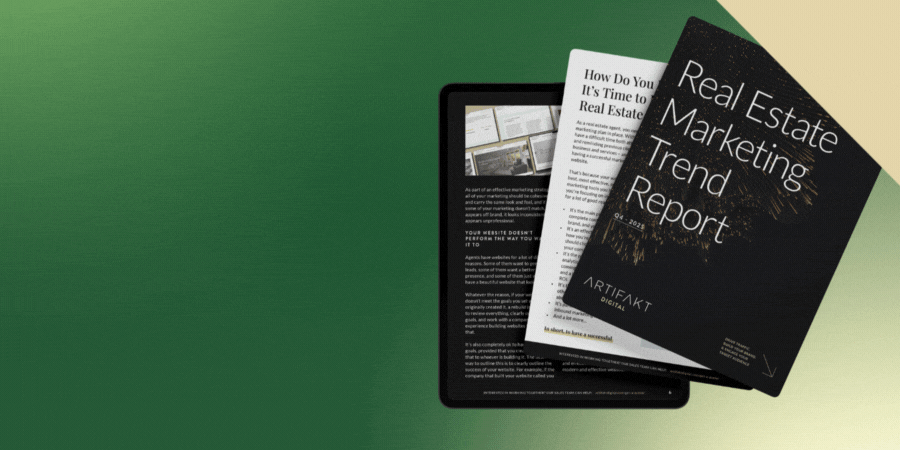Why Every Agent Should Have Their Own, Personal Brand

As a real estate agent, you need to have your own personal brand. There’s really no 2 ways about it.
Your brand is a representation of who you are and what you stand for, and it gives people a connection with you before they even meet you.
In short, your brand defines who you are.
There are a lot of agents that rely too heavily on their brokerage to serve as their brand, and in my opinion, that’s a mistake. As an agent, tying yourself too closely to your brokerage is risky simply because you don’t know what will happen in the future.
If your brokerage closes or changes direction, or if you decide to leave on your own, without your own brand, you’ll also be giving up your identity.
Even your email address should be branded and under your control; you shouldn’t be using an email address tied to your brokerage. If you do that, your brokerage essentially owns your email, and it can make moving to a new brokerage really difficult for you. Imagine losing all of your emails, or worse, getting a new email address from your new brokerage and not being able to forward your previous email address.
Simply put, as much as possible, you should personally own and have control over all aspects of your business and your brand.
When it comes to your personal brand, all brokerages are different, and they all have levels of control around what you can and can’t do. For example, some brokerages don’t care at all and will allow you to do whatever you want with your brand; and even allow you to manipulate the brokerage logo. While others maintain very strict guidelines and may not even let you brand yourself at all; so, it’s best to check with your brokerage to see what their rules are before you decide to brand yourself.
Although it makes sense that a brokerage would want to protect their brand, it doesn’t make sense that they won’t allow you to brand yourself for any other reason than that they are trying to control you, and maybe even intentionally make it harder for you to leave if you want to.
Your brand is who you are, it’s how the public and potential clients see you, and it’s much more than a logo.
★ Want to learn more about branding? Have a look at these posts:
- The Steps to Building a Trustworthy Personal Real Estate Brand
- Why Agents Need Brand Guidelines, Not Just a Logo
- Planning an End-to-End Brand Experience for Your Real Estate Business
When you go through a branding process, your goal should actually be to get branding guidelines, not just a logo. Branding guidelines define all of the important aspects that make up what your brand feels like and what it stands for. Typical branding guidelines should include:
- A mission statement and/or goals.
- Imagery that shows what emotion you want the brand to evoke.
- The fonts, as well as rules around how they can be used.
- The color palette, as well as rules around how they can be used.
- A main logo (and often white, black, and knockout versions), as well as rules around how they can be used.
- Supporting graphics and/or secondary logos.
- Examples of brand application in some of your materials.
Every designer will have their own variation on their process and what they supply as part of the branding guidelines, and it can certainly be more complex than the above, but you need at least the above to have a clear outline of your brand that any member of you marketing team should be able to pick up.
At Artifakt, we firmly believe that every agent is different and every agent is unique. Every agent has their own style and their own way of doing things, and your brand is a big part of separating yourself from other agents and showing off what makes you unique.
Your brand does the speaking for you when you’re not around. As a brand, you’re likely going to attract people and you’re likely going to push people away, and that’s ok. You shouldn’t be all things to all people.
Your brand needs to be cohesive, and it needs to carry through to everything that you do. And it’s more than visual; your website, your social media, and your print material should all be cohesive and carry the look and feel of your brand, but your brand also has a voice. How does your brand speak? What does your brand sound like? Does your brand use contractions or more formal language? What words does your brand use and what words does your brand avoid? All of this not only builds consistency, but also makes you more appealing to your ideal target audience.
Without a brand, you’re not you. Without a brand, you don’t have much to differentiate yourself. The world’s biggest companies spend huge budgets to develop and build their brands, and while you may not need to go as far as those large companies do, you should still have guidelines and consistent materials in place to make yourself stand out. Your personal brand is important.
With up to date marketing trends relevant to today’s market, our report is a selection of curated content, information, and data that will give you an outline of what’s working right now in real estate marketing.






















